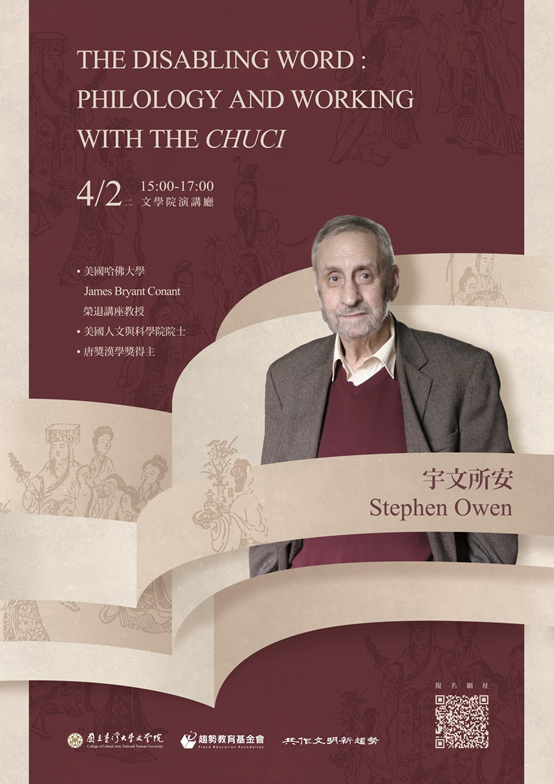【共作文明新趨勢計畫】 演講 —— The Disabling Word: Philology and Working With the Chuci (Stephen Owen)

趨勢教育基金會捐贈本校「共作文明新趨勢」計畫,由文學院負責執行。文明、文學、文化和歷史之間存在緊密而複雜的關係,彼此相互交織,這些元素共同塑造了人類社會的發展軌跡。文學作為重要的文化表達形式,承載著思想、情感與經驗;文學作品同時為文化的產物與塑造者,藉由語言、風格、主題等方面的表現,展示了特定文化的內涵,及其獨特魅力;而跨文化的交流理解,認識世界的多樣性,文學更是不可或缺的媒介。至於詮釋歷史事件與社會變革,描繪生活景象,反映時代的風貌人物,文學作品透過文字,加以想像力與藝術性的再現,將之傳諸後世。文學的意義,既反映文明的成就,也推動文明的進程。
「共作文明新趨勢」計畫的主題講座,首場將邀請美國漢學家,哈佛大學James Bryant Conant榮退講座教授宇文所安 (Prof. Stephen Owen) 於4月2日下午在台大文學院舉行專題演講,講題為The Disabling Word: Philology and Working With the Chuci。
宇文所安教授是論述文明交接與交織的前瞻學者,他不僅是美國人文與科學院院士、美國哲學會會士,也是2018年第三屆唐獎漢學獎得主。宇文所安教授長年從事中國古典詩歌和文論,以及比較文學和世界文學研究,尤以唐詩研究名著於世,曾以八年時間翻譯杜甫近1,400首詩作,完成三千多頁《杜甫詩集》(The Poetry of Du Fu)。著有《初唐詩》、《盛唐詩》、《追憶:中國古典文學的往事再現》、《中國文論:英譯與評論》、《他山的石頭記》、《迷樓:詩與慾望的迷宮》、《中國「中世紀」的終結:中唐文學文化論集》等專著和論文,大多數已被陸續翻譯成中文出版。其中譯注《中國文學選集》榮獲美國文學翻譯協會國家獎。宇文所安教授的學術研究與翻譯均有跨越國界、文化的成果,斐聲國際,貢獻卓著,這次講座聚焦上古楚辭文本,將為古典文學研究帶來嶄新的視野。
演講時間:113年4月2日(星期二)下午3:00
演講地點:國立臺灣大學文學院演講廳
報名網址:https://forms.gle/nWDTjCQxWkK2WxxS6
Trend Education Foundation has donated the “Advancing Connected Futures” project to our university, which is being implemented by the College of Liberal Arts. There exists a close and complex relationship among civilization, literature, culture, and history. They intertwine with each other, and shape the trajectory of human societal development. Literature, as a significant form of cultural expression, conveys thoughts, emotions, and experiences; literary works simultaneously are products of and shapers of culture. Through language, style, themes, and other aspects of representation, they demonstrate the essence of specific cultures and their unique charm. Cross-cultural communication and understanding the diversity of the world are facilitated by literature, making it an indispensable medium. As for interpreting historical events and societal changes, depicting life scenes, and reflecting the characteristics of the times and people, literary works pass them on to future generations through words, imagination, and artistic representation. The significance of literature not only reflects the achievements of civilization but also propels the progress of civilization.
The inaugural lecture of the “Advancing Connected Futures” project featuring an international scholar will be held in the lecture hall of the College of Liberal Arts. We are honored to invite Professor Stephen Owen, a renowned Sinologist from the United States and the James Bryant Conant University Emeritus Professor at Harvard University, to deliver a lecture titled “The Disabling Word: Philology and Working with the Chuci” on April 2nd from 15:00 to 17:00.
Professor Owen is a forward-thinking scholar known for his exploration of the exchange and integration of civilizations. He is not only a Fellow of the American Academy of Arts and Sciences and a member of the American Philosophical Society, but also the recipient of the 2018 Tang Prize in Sinology. Professor Owen has been deeply engaged in the study of classical Chinese poetry and literary theory, as well as comparative literature and world literature. He is particularly renowned for his groundbreaking research on the works of Du Fu.
Over the course of eight years, He translated nearly 1,400 poems by Du Fu, culminating in the publication of The Poetry of Du Fu, totaling over three thousand pages. He has authored several monographs and essays, including The Poetry of the Early Tang, The Great Age of Chinese Poetry: The High Tang, Remembrances: The Experience of the Past in Classical Chinese Literature, Readings in Chinese Literary Thought, Tashande shitou ji, Milou: Poetry and the Labyrinth of Desire, The End of the Chinese ‘Middle Ages’: Essays in Mid-Tang Literary Culture. Most of these works have been translated into Chinese and published successively. The translated work An Anthology of Chinese Literature was honored with the National Translation Award by the American Literary Translators Association. Professor Owen’s academic and creative endeavors have transcended national borders and cultural boundaries, earning him international acclaim for his remarkable contributions. His participation in this project will offer a fresh perspective to the study of classical literature and provide the academic community in our country with the most cutting-edge research trends.
